Home
Services
Products
Projects
Who We Are
Blogs
Contact Us

Mastering Mobile App Development Costs in 2025: A Comprehensive Guide
Embarking on mobile app development is an exciting venture, but navigating the associated costs can be challenging, especially for first-timers. The final price tag hinges on several factors, including the app's type and your chosen development approach.
Some estimates suggest professional app development can range from $40,000 to $500,000, with variations stemming from complexity and features.
Alternatively, a DIY approach using no-code platforms like Defx can significantly reduce costs to around $600 annually. Defx empowers you to build your own app, even without coding experience, at a fraction of the traditional development cost.
This guide dissects the expenses involved in each development stage, enabling informed decisions about bringing your app vision to life.
Navigating App Development Costs by Process
Choosing the right development process is crucial for cost management. Options include in-house developers, agencies or freelancers, and no-code platforms like Defx.
In-house teams offer high customization but come with higher costs. Agencies and freelancers provide a middle ground, while no-code builders like Defx are the most budget-friendly option. Let's explore the nuances:
The Cost of In-House Developers
Hiring in-house developers represents a substantial investment. Beyond the annual salary, ranging from $80,000 to $120,000 or more, additional expenses include benefits (health insurance, retirement plans, paid leave) totaling 30-40% of the base salary, plus training and development costs.
Experienced developers command higher salaries. While costly, in-house teams offer greater control and oversight, facilitating real-time collaboration and precise execution for complex applications. Carefully weigh the advantages of direct control against the financial commitment.
The Cost of Development Agencies or Freelancers
Hiring an agency or freelancer for app development introduces variable costs. Freelancers average around $59 per hour, while experienced contractors may charge $100 or more. Agencies typically bill between $100 and $250 per hour.
While potentially offering short-term savings, long-term costs can escalate. Higher hourly rates accumulate, and less hands-on involvement can extend development timelines. Future updates and maintenance depend on contractor availability, potentially leading to further expenses and project handover complexities.
Agencies or freelancers can be suitable for short-term projects or simpler apps, but long-term or complex projects may incur higher overall expenses.
The Cost of No-Code App Builders
No-code app builders offer significantly lower upfront costs. Defx, for example, starts at $49 per month with annual billing, including a 14-day free trial.
These platforms accelerate development with pre-built, tested templates, enabling faster time-to-market. No coding expertise is required, making app development accessible to everyone.
No-code builders eliminate the need for specialized developers proficient in languages like Flutter, Swift, or React Native. Updates and maintenance are often included in the subscription, further reducing ongoing costs.
In essence, no-code app builders offer cost savings, speed, user-friendliness, and accessibility.
Factors Influencing App Development Costs
Beyond the development process, factors like app type, complexity, design, and development location significantly impact costs.
App Type
The app type is a primary cost determinant. Consider whether you need an iOS, Android, hybrid, or cross-platform app.
Native Android development is often slightly cheaper than iOS due to wider device compatibility and a simpler publishing process.
Cross-platform development (targeting both Android and iOS) can offer savings by eliminating the need for separate teams, providing broader reach with a single development effort. Costs typically range from $10,000 to $100,000+, depending on complexity.
Industry-specific factors also play a role. Restaurant apps tend to be less expensive due to simpler functionalities, while social media, streaming, or e-commerce apps, with their more complex features, often incur higher costs.
App Complexity
Complexity directly correlates with cost. Simple apps with basic features are less expensive to develop. Complex apps incorporating user profiles, messaging, social features, or animations require more extensive backend development, custom APIs, and integrations, driving up costs.
App Design
Custom UI/UX design can significantly increase costs, potentially exceeding $100,000. Creating unique elements, tailored interactions, and new features requires more time and resources.
Pre-built templates from Defx, costing around $600 annually, offer a cost-effective alternative. While less customizable, they drastically reduce design expenses, making them ideal for basic app development.
Development Location
Outsourcing to regions like India or Eastern Europe can lower development costs due to lower labor rates.
- India: $15–$50/hour
- Eastern Europe: $40/hour
- Australia/United States: $90–$150/hour
App Development Costs by Stage
Understanding stage-wise costs enables effective budgeting. Cutting corners in any stage can lead to long-term problems and increased expenses. The following table illustrates a cost and timeline comparison across development approaches:

Hidden App Development Costs
Beyond upfront costs, hidden expenses can accumulate:
- Server Expenses: Ongoing hosting costs.
- App Maintenance: Regular updates and bug fixes.
- App Marketing: Reaching your target audience.
- Security Measures: Protecting user data.
- Customer Support: Addressing user inquiries.
Reducing Mobile App Development Costs
Several strategies can minimize costs without sacrificing quality:
- Pre-Built Components and Templates: Leverage existing resources.
- Minimize App Complexity: Start with an MVP and prioritize core features.
- Prioritize Testing: Catch and fix issues early.
- No-Code App Builders: Use platforms like Defx to reduce development time and labor costs.
Defx empowers you to create high-quality apps efficiently and cost-effectively. Explore Defx today with a 14-day free trial and experience simplified, affordable mobile app development.
See More
Contact Us
Let’s make your Idea into Reality
Let's Talk
© Copyright DEFX. All Rights Reserved
GoodFirms ★ 4.2
Clutch ★ 4.2
Google ★ 4.2
